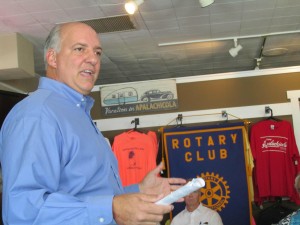By BRUCE RITCHIE
FLORIDAENVIRONMENTS.COM
APALACHICOLA — Both candidates in the race for Congress in the Florida Panhandle say the Apalachicola River and the tri-state water wars are an important issue for voters in the district.
Alabama, Florida and Georgia have been fighting in federal court since 1990 over water from the Apalachicola-Chattahoochee-Flint system. Last year, Gov. Rick Scott filed a lawsuit against Georgia in the U. S. Supreme Court seeking to divide water among the states.
Rep. Steve Southerland, R-Panama City, is facing Democratic challenger Gwen Graham, daughter of former U. S. Sen. Bob Graham, D-Miami Lakes, in the Nov. 4 election.
Southerland said he has been working to get federal law changes to counter what he says is a misinterpretation of federal law by the U. S. Army Corps of Engineers. But Graham said there needs to be less finger-pointing and more cooperation with other states and the federal agency.

After paddling last week in a canoe with her father along a tributary of the Apalachicola River in Franklin County, Gwen Graham called the river “a unique and very precious and important issue.”
“That river needs to be protected,” she told an audience in Apalachicola. “And it is time to stop the fighting. It is time to stop being unwilling to work together to do what is right for the community of Franklin County.”
Graham said she would seek cooperation with the Georgia congressional delegation.
She also said she would work to protect the river by establishing relationships with the Corps of Engineers, which operates dams that control water flow in the river.
“The Corps of Engineers — they need to know that I’m someone not only that they want to talk with but they can trust,” she said.
Asked by Florida Environments whether she agrees with Gov. Rick Scott that Georgia is wasting water, Graham responded, “We need to get past criticizing one another and work towards finding a way to support — whether Georgia, Alabama or Florida — to support one another in the interest of all.”

But Southerland said in response on Tuesday that Scott didn’t have any choice but to file a lawsuit against Georgia because the U. S. Supreme Court had refused to hear Florida’s appeals from two federal appeals court.
“How else are we going to get the issue there (before the Supreme Court)?” he said.
During an interview following a luncheon speech in Apalachicola on Tuesday, Southerland disagreed with Graham’s suggestion that the issue can be resolved through cooperation — or by Florida “rolling over” on the issue as someone at his lunch table suggested.
“I think part of what our responsibility is — as a representative — is to go up there and fight for our district and to fight for more water,” Southerland told Florida Environments. “I would think most people in Franklin County would agree with that battle — that I fight for water.”
During his presentation to the Rotary Club, Southerland said water is being wasted in Georgia.
“You all know of the urban sprawl around Atlanta,” he said. “You all know of what’s going on in the southwest part of the state of Georgia (where farms are located). There is a lot of water being wasted. Yet Florida is doing everything we can for proper conservation of water on our farms. Water is precious. We understand that.”
But he said the disagreement among the states stems from what he considers to be a misinterpretation by the Corps of Engineers of the Water Supply Act of 1958.
Southerland said the Corps of Engineers is not taking responsibility when salinity levels in Apalachicola Bay increase because of low flows. Scientists say those low flows were responsible for a collapse of the bay’s oyster population in 2012.
“I think that’s crazy,” Southerland said. “When they control flows coming down the ACF (Apalachicola-Chattahoochee-Flint), they are responsible.”
Southerland said he asked senators from Alabama and Louisiana to insert language in the Water Resources Reform and Development Act that now serves as a “legislative backstop” on the water issues.
The federal law now urges the governors to reach a water sharing agreement. And it says that if they can’t, Congress “should consider appropriate legislation to address these matters including any necessary clarifications” to the Water Supply Act of 1958
“For the very first time we have legislative language that gives us the right to do that (be a legislative backstop),” he said. “That’s something we haven’t had in the four decades we’ve been waging this battle.”
(Photos and story copyrighted by Bruce Ritchie and Floridaenvironments.com. Do not copy or redistribute without permission, which can be obtained from bruceBritchie@gmail.com .)
